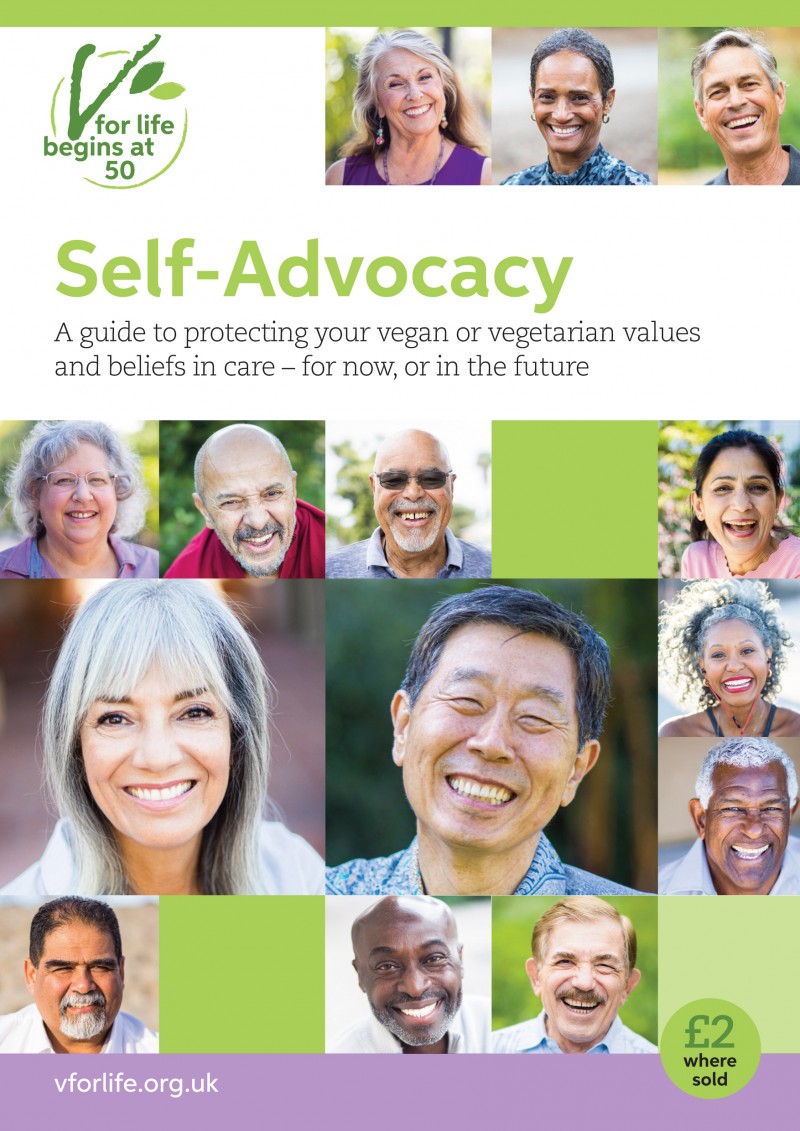This Dementia Action Week (19–25 May 2025) is a good opportunity to think about how we as vegans and vegetarians can protect our rights and safeguard our diets and identities as we get older.

V for Life exists to support older vegans and vegetarians (veg*ns for short). One of the things we know is that veg*nism is usually a lot more than a dietary preference. It’s about our core beliefs, and a central part of our identity.
Yet we know through our work that many older veg*ns find themselves losing control over this basic decision as they age. We are working hard to change that, and one of the biggest things we do is to help veg*ns to help themselves.
Our Self-Advocacy Pack empowers both older veg*ns and their loved ones to stand up for their rights. We have rights to have our dietary preferences – and the beliefs and identity that underpin them – respected. We are protected by legislation such as the Equality Act and Human Rights Act, and by various care regulations.
Because, as we get older, we often become more reliant on others. This includes needing others to take practical steps for us that help us to live our values. Things look very different when we no longer have full control over what we eat, when we eat, and with whom we eat.
Nowhere is this clearer than in care. Around 70 per cent of people living in care homes have dementia or severe memory problems. Suddenly, questions begin to arise such as ‘if I get dementia, will they serve me meat?’, and the answer is not always clear-cut. Sometimes, even with the best of intentions, vegan residents are served food fortified with dairy ‘for their own good’ (when plant-based alternatives are easily available). Or life-long vegetarians with severe dementia see meat all around them and start asking for it, even though it goes against their core beliefs.
If there’s one message it promotes, it’s that we don’t need to wait until our autonomy is threatened to do something about it. The time to act is now. Because, however invulnerable we may feel, the reality is that diminished physical and mental capacity could come to us at any time.
 The Self-Advocacy Pack offers practical tools to take things into our own hands before a problem arises. It sets out our rights, and the legislation and regulations that underpin them. It emphasises the importance of setting out in legally-binding form how you’d like to be treated. And, while it’s better to act sooner rather than later, the Self-Advocacy Pack also supports people to advocate on their own behalf if already in a care setting, or to advocate on behalf of a loved-one.
The Self-Advocacy Pack offers practical tools to take things into our own hands before a problem arises. It sets out our rights, and the legislation and regulations that underpin them. It emphasises the importance of setting out in legally-binding form how you’d like to be treated. And, while it’s better to act sooner rather than later, the Self-Advocacy Pack also supports people to advocate on their own behalf if already in a care setting, or to advocate on behalf of a loved-one.
We hear time and time again from older veg*ns and their families who have been given food that goes against their fundamental dietary beliefs. The Self-Advocacy Pack talks through the key steps in ensuring that this doesn’t happen to you, from creating a Statement of Wishes, through who to raise concerns with, and on to how to seek redress if need be.
What does the Statement of Wishes cover?
Our template covers a range of key areas that reflect the concerns of vegans and vegetarians, such as:
How to complete your Statement of Wishes
Our template is designed to be straightforward and easy to fill in. You can add text to each section by clicking or tapping on the fields provided. There’s also space to elaborate on your choices, ensuring your preferences are as detailed as you wish. Once completed, it’s important to share the document with those closest to you, as well as your GP, to make sure it’s readily available if needed.
Here’s a simple guide to completing the form:
For many, this could be the difference between staying or not staying vegan or vegetarian for life.
For more information, and to download a free copy of the Self-Advocacy Pack, please go to: https://vforlife.org.uk/pages/advocacy
Categories:
VfL News and Events